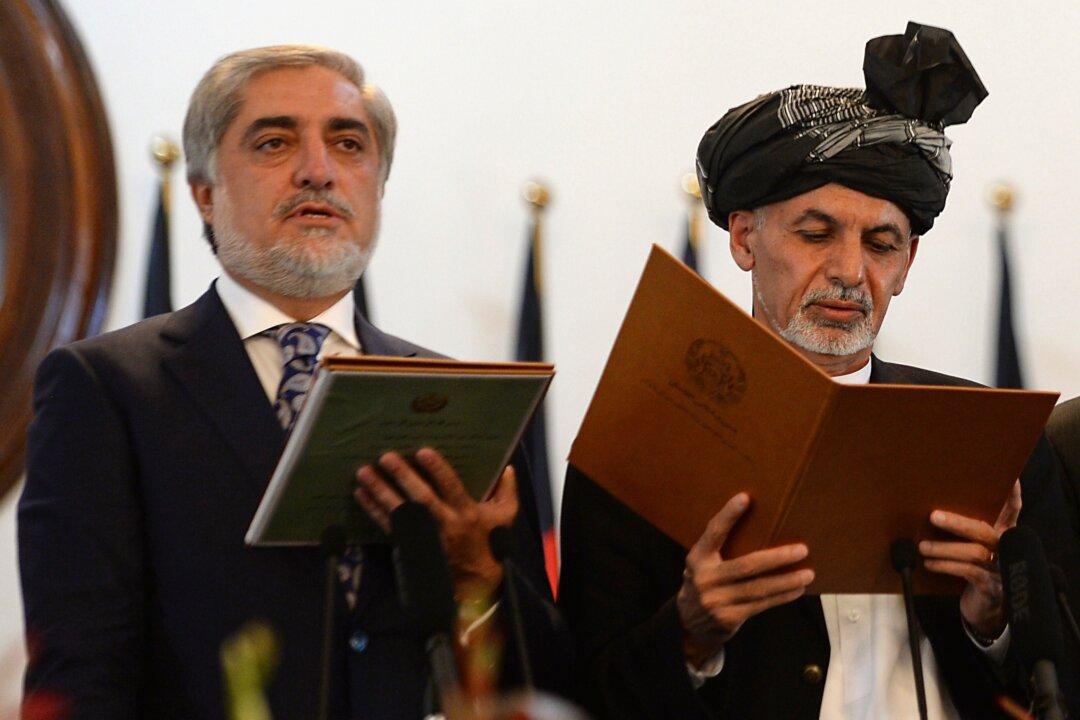Afghanistan is often thought of as a place where some of the world’s most dangerous Islamists have taken refuge, been nurtured, and been allowed to launch regional and global jihad. Yet, with the agreement to form a unity government, the nation has provided an answer to extremism. Admittedly, the presidential election results were so riddled with fraud that it is probably impossible to determine who actually won. But it may nevertheless result in a victory for democracy. Seven million people risked their lives to vote. They voted for two men, both of whom stand for globalization, democracy, economic development, and human rights. Ashraf Ghani Ahmadzai and Abdullah Abdullah’s recent agreement on a power sharing relationship could prove to be an important step toward stability and good governance.
If the ongoing conflict pitting the Taliban against Afghan and international forces is a choice of theocracy versus globalization, democracy, and human rights, then the high voter turnout is a clear indication of where the Afghan people stand. They had a choice between two of Afghanistan’s most moderate, modern, and qualified leaders. Undoubtedly, many Afghans have grievances against Kabul due to its poor governance and corruption, as well as its failure to bring security to much of the country. They are understandably angered by the high number of civilian casualties in the fight against the Taliban. Yet their votes attest to the fact that they are still willing to put their trust in a national government that promises to bring democracy, economic development, and peace. Now it is up to the unity government, with the help of the international community, to make progress toward these goals.
President Karzai’s anti-American rhetoric often characterized the last several years of U.S-Afghan relations. Karzai often criticized the United States—his country’s most significant ally and financier—without consideration for how such rhetoric could affect the war effort and its support among the American public. His commentary also encouraged conspiracy theories and fueled anti-American sentiment among the Afghan public. The Karzai administration’s stance against Pakistan was also inconsistent, hostile, and out of line with international diplomatic norms. While Pakistan has undoubtedly contributed to the instability in Afghanistan, a hostile and threatening Afghan administration is the last thing that will persuade Pakistan to abandon its support for the Taliban or fight the group on Pakistani soil.
Both Abdullah and Ghani have time and again stressed the significance of Afghanistan’s alliance with the United States. They both have proposed a more pragmatic, consistent, and non-hostile attitude toward Pakistan. These two men have the potential to influence Afghan political thinking by simply behaving and speaking in line with international diplomatic norms and making decisions that will serve the best interest of the country rather than appealing to only a segment of the population.
The unity government must also resolve political conflicts peacefully. In Afghanistan, politics is traditionally seen as a zero sum game where the winner takes all. However, Ghani and Abdullah agreeing to compromise on a unity government, albeit after months of cliff-hanging negotiations, may have set an important precedent for putting the future of the country ahead of leaders’ desire for exclusive political power.
Ethnic differences have also for the time being been put aside. Although Abdullah generally enjoyed the support of Tajiks and Hazaras, while Pashtuns and Uzbeks backed Ghani in the May election, both candidates had individuals of other ethnic groups as their vice presidents and supporters. Ethnic rivalries and mistrust are a reality in Afghanistan, but the country is not ethnically fragmented to the extent that any of the various groups have separatist aspirations. Still, going forward, the new government will have to keep ethnic considerations in mind. The establishment of the CEO post, slated to become a prime ministership, which takes some powers away from the president, may provide a greater opportunity for an ethnically inclusive government.
Additionally, the unity government could give Afghanistan a much-awaited “present” first lady. Despite former president Karzai’s claimed commitment to women’s rights, his wife was well hidden. On the other hand, Ghani’s wife, Rula, a Christian-Lebanese woman rumored to have a Jewish parent, made her first public appearance on International Women’s Day during one of her husband’s rallies. Many conservative imams have been scathing in their denunciation of Mrs. Ghani. Her religion, along with her possible Jewish heritage, was brought up many times during the presidential election campaign. Ghani’s support among voters attests to the fact that the public disregarded the views of the imams and Islamists. Mrs. Ghani’s public presence as Afghanistan’s first lady will send out strong messages both domestically and internationally, conveying a departure from a tradition that considers women to be provocative if they appear in public among namahram (non-relative) men. It will also tell the world that the Taliban and the Islamists do not hold sway on social issues.
Despite an increased Taliban insurgency, cooler Afghan-American relations, and a sagging economy, Afghanistan has made significant political, social, and economic progress in the last decade. Afghanistan is the victim of years of war and remains in conflict as it tries to establish a state and economy. The new government, built on compromise and forbearance, gives Afghan democracy, perhaps for the last time, an opportunity to succeed.
Marvin G. Weinbaum is professor emeritus of political science at the University of Illinois at Urbana-Champaign, and served as analyst for Pakistan and Afghanistan in the U.S. Department of State’s Bureau of Intelligence and Research from 1999 to 2003. He is currently a scholar-in-residence at the Middle East Institute in Washington DC.
Meena Yousufzy is from Kabul, Afghanistan. She graduated from Smith College with degrees in government and psychology. She has worked for and been associated with many non-profit organizations based in Kabul.
This article was originally published in the Middle East Institute.
